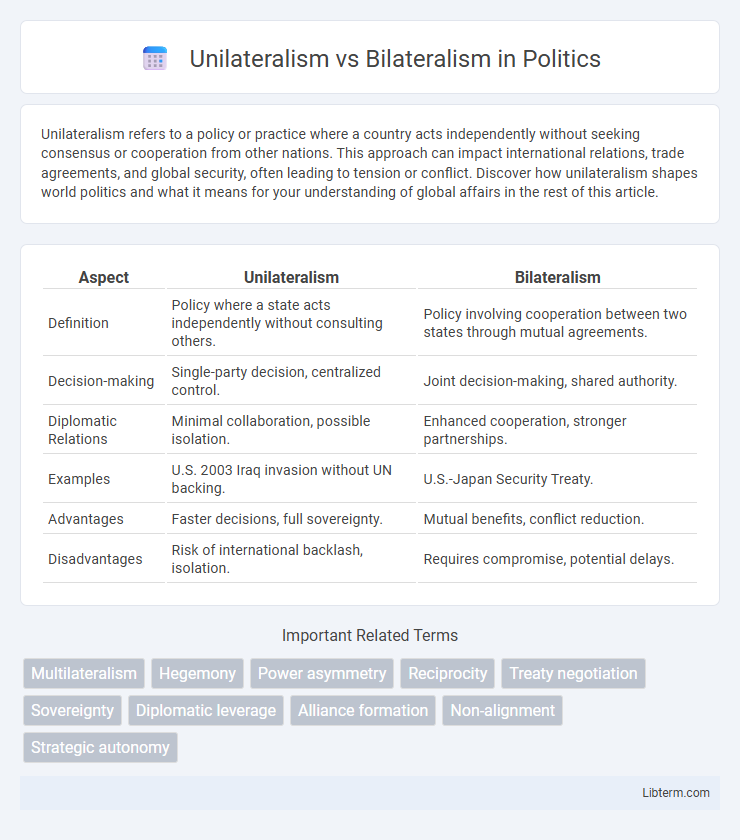Unilateralism refers to a policy or practice where a country acts independently without seeking consensus or cooperation from other nations. This approach can impact international relations, trade agreements, and global security, often leading to tension or conflict. Discover how unilateralism shapes world politics and what it means for your understanding of global affairs in the rest of this article.
Table of Comparison
| Aspect | Unilateralism | Bilateralism |
|---|---|---|
| Definition | Policy where a state acts independently without consulting others. | Policy involving cooperation between two states through mutual agreements. |
| Decision-making | Single-party decision, centralized control. | Joint decision-making, shared authority. |
| Diplomatic Relations | Minimal collaboration, possible isolation. | Enhanced cooperation, stronger partnerships. |
| Examples | U.S. 2003 Iraq invasion without UN backing. | U.S.-Japan Security Treaty. |
| Advantages | Faster decisions, full sovereignty. | Mutual benefits, conflict reduction. |
| Disadvantages | Risk of international backlash, isolation. | Requires compromise, potential delays. |
Introduction to Unilateralism and Bilateralism
Unilateralism refers to a country's independent action in international relations without the consent or cooperation of other states, often prioritizing national interests and sovereignty. Bilateralism involves two countries collaborating directly through agreements or negotiations to address mutual concerns or enhance diplomatic and economic ties. Understanding these approaches highlights differing strategies in global diplomacy, where unilateralism emphasizes autonomy and bilateralism stresses partnership.
Defining Unilateralism: Concept and Characteristics
Unilateralism refers to a nation's approach to policy-making and international relations where decisions are made independently without seeking the consent or cooperation of other states. This concept emphasizes sovereignty and self-reliance, often characterized by swift decision-making, limited negotiation, and a focus on national interests over collective agreements. Key features include autonomous action, minimal multilateral engagement, and prioritization of domestic priorities in global affairs.
Understanding Bilateralism: Meaning and Features
Bilateralism refers to a diplomatic approach where two countries engage in agreements or negotiations directly addressing mutual interests, emphasizing cooperation and reciprocity. Key features include equal participation, focused dialogue on shared issues, and formal treaties or partnerships that enhance economic, political, or security relations. This approach contrasts with unilateralism by promoting collaboration and negotiated consensus between sovereign states.
Historical Context: Evolution of Unilateral and Bilateral Approaches
Unilateralism and bilateralism have evolved significantly throughout history, reflecting shifts in global power dynamics and diplomatic strategies. Unilateral approaches were predominant during periods when dominant states exercised independent decision-making to assert influence, such as the U.S. foreign policy in the early 20th century. Bilateralism gained prominence post-World War II, emphasizing direct negotiations between two countries to foster cooperation, exemplified by treaties like the U.S.-Soviet arms control agreements during the Cold War.
Key Differences: Unilateralism vs Bilateralism
Unilateralism involves a country acting independently in international relations without seeking agreement from other states, emphasizing national sovereignty and swift decision-making. Bilateralism requires two countries cooperating to negotiate agreements or resolve issues, fostering mutual benefits and diplomatic dialogue. Key differences lie in the scope of collaboration, decision-making processes, and the level of influence shared between the involved parties.
Pros and Cons of Unilateralism in International Relations
Unilateralism in international relations enables a nation to act decisively without the need for consensus, ensuring swift policy implementation and preserving national sovereignty. However, it risks isolating the country diplomatically, reducing cooperation opportunities and potentially provoking retaliatory measures from other states. The approach may also undermine multilateral institutions and global governance frameworks, limiting long-term stability and collaboration.
Benefits and Challenges of Bilateral Agreements
Bilateral agreements enhance diplomatic relations and facilitate targeted economic cooperation between two countries, often resulting in streamlined trade, investment opportunities, and tailored regulatory frameworks. Challenges include the complexity of negotiation processes, potential imbalance of power favoring the stronger partner, and the exclusion of third countries, which can limit broader multilateral benefits. Effective bilateral agreements require careful management of sovereignty concerns while ensuring mutual benefits to sustain long-term partnerships.
Case Studies: Real-World Examples of Unilateralism and Bilateralism
The U.S. invasion of Iraq in 2003 exemplifies unilateralism, where action was taken without broad international support, highlighting the risks of isolated decision-making in global politics. In contrast, the U.S.-Mexico-Canada Agreement (USMCA) showcases bilateralism by negotiating trade terms that benefit all three parties, illustrating cooperative and mutually beneficial diplomacy. These cases demonstrate how unilateralism can lead to international isolation while bilateralism fosters long-term partnerships and economic integration.
Impact on Global Diplomacy and Policy Making
Unilateralism often leads to fragmented global diplomacy as nations prioritize independent decision-making, which can cause tension and reduce cooperation on international issues. Bilateralism fosters targeted cooperation between two countries, enabling tailored agreements that address specific mutual interests while contributing to more stable and predictable policy outcomes. The balance between these approaches significantly impacts the effectiveness of global governance, diplomatic alliances, and the negotiation of multilateral treaties.
Future Trends: The Balance Between Unilateralism and Bilateralism
Future trends indicate a dynamic balance between unilateralism and bilateralism shaped by global geopolitical shifts and economic interdependence. Nations increasingly weigh the effectiveness of unilateral actions against the strategic benefits of bilateral agreements in addressing complex international challenges such as trade disputes, climate change, and security threats. Emerging multipolarity and technological advancements will continue to influence states' preference for either independent decision-making or collaborative partnerships.
Unilateralism Infographic

 libterm.com
libterm.com